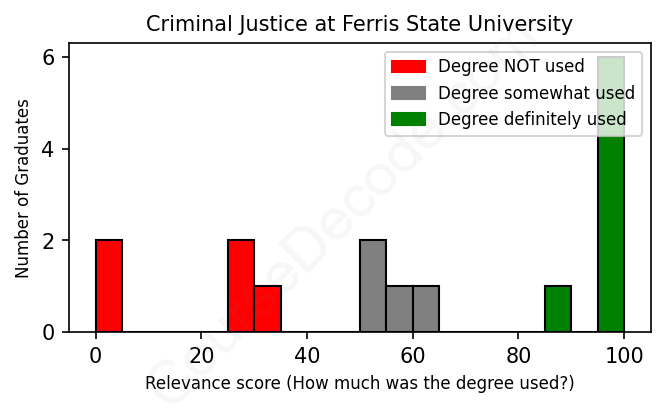
First, some facts. Of the Criminal Justice graduates from Ferris State University we've analyzed , here's how many have used (or NOT used) their degree in their career:

These are estimates based on AI analysis of 16 LinkedIn profiles (see below).
The verdict? Slightly below average. Overall, with an average relevance score of 62%, Criminal Justice graduates from Ferris State University have a slightly lower likelihood (-5%) of finding work in this field compared to the average graduate across all fields:
And for comparison, here's the chart for all profiles we've looked at across all degrees.
Also, after graduating, only 25% of these graduates have pursued further education other than another Bachelor's degree (such as a Masters degree or other), compared to the average across all profiles of 35%. This suggests a Bachelors degree is enough for most Criminal Justice graduates, and it's normal to look for work straight after graduation.
See the details:
|
Relevance score: 100% We think this person has gone into a career highly relevant to their degree. We think this person has gone into a career highly relevant to their degree.
DEGREE INFOGraduated in 2017 from Ferris State University with a Bachelor of Applied Science - BASc in Criminal Justice. No other secondary education since. JOB HISTORY SINCE GRADUATIONSecurity Guard Lagarda Security Sep 2018 - Mar 2020 ABOUTAs military police soldier in the United States Army for the last 8 years, I have gained many skills useful in a job force as well as in my own personal life. With two deployments (Afghanistan and Kuwait)I understand hard work and sacrifice when it comes to getting my job duties accomplished. I earned my Bachelors Degree from Ferris State University in December of 2017 while I raised my kids. I graduated with a 3.8 GPA. Currently I work as a Security Officer (Bailiff)for a Judge at the 67th District Court in Flushing Michigan. |
The top 10 most common jobs done by the graduates we've analyzed (ranked most common to least) are:
When looking at the career paths of graduates from Ferris State University with a degree in Criminal Justice, you’ll notice a mix of roles. Many graduates have found jobs in law enforcement and corrections, including positions like Sheriff Deputy, Police Officer, and Correctional Officer. These roles are directly linked to Criminal Justice studies, as they involve applying the skills and knowledge acquired during their education to real-world scenarios in public safety and law enforcement. Graduates in these positions clearly leverage their degree in practical, impactful ways, tackling crime prevention and community safety head-on.
On the flip side, not all graduates have found jobs that align closely with their Criminal Justice degree. Many have taken on roles that involve transferable skills but don’t necessarily tap into criminal justice knowledge, like positions in human resources, sales, or community serving fields that focus more on general management and customer service than on justice principles. While some jobs, like Staffing Specialist or Youth Advocate, can relate to social justice themes, they don’t directly utilize core criminal justice skills. Overall, it’s a mixed bag: some grads are right in the thick of law enforcement, while others are navigating worlds that don’t require their Criminal Justice training as much but still contribute to community wellbeing in different ways.
Here is a visual representation of the most common words in job titles for Criminal Justice graduates (this is across all Criminal Justice graduates we've analyzed, not just those who went to Ferris State University):

Graduates from Ferris State University's Criminal Justice program seem to follow a mix of career paths, with many stepping into roles that are at least somewhat related to criminal justice early on after completing their degrees. For the first jobs, you’ll often see them taking positions such as police officers, sheriff deputies, or even roles in security. Some, however, branch out into fields like human resources or education. The variability suggests that while a solid number find their way into law enforcement or security jobs, there are also those who explore other professional avenues, potentially indicating a diverse array of interests and opportunities post-graduation.
Looking five to ten years down the road, the picture becomes a bit more mixed. Some alumni remain in or advance within criminal justice fields—like becoming probation officers or police lieutenants—but others pivot significantly, finding themselves in seemingly unrelated roles, such as staffing specialists or therapeutic positions. This could reflect a broader trend where graduates leverage their skills in various sectors, even if those sectors aren’t directly tied to criminal justice. Overall, while many graduates do find fulfilling roles within the realm of criminal justice, others seem to have taken a less direct path, emphasizing the importance of skill versatility in today’s job market.
Honestly, a Bachelor’s degree in Criminal Justice at Ferris State University is pretty manageable, especially if you’re interested in the subject. The coursework usually covers a lot of engaging topics like crime theory, law enforcement, and the justice system, so it keeps things interesting. While it does require some writing and research, it’s not typically considered one of the tougher degrees out there compared to things like engineering or pre-med. That said, like any college program, you'll need to put in some effort and stay on top of your assignments, but if you’re passionate about criminal justice, you’ll likely find the experience rewarding rather than overly challenging.
Most commonly, in the LinkedIn profiles we've looked at, it takes people 2 years to finish a Bachelor degree in Criminal Justice.
So, looking at these Ferris State University grads and their job journeys, it seems like a mixed bag when it comes to making good money. Some of the earlier graduates started off in pretty low-paying roles like drivers and sales associates, which probably didn't bring in much cash, but they slowly moved up to more substantial positions like Human Resources Manager or even Police Officer, which tend to pay better. Meanwhile, the more recent grads are still climbing the ladder, with some like the Sergeant and Lieutenant positions in law enforcement likely pulling in decent salaries. Overall, while a few are probably doing really well now, especially those in higher-level jobs, it looks like many started off earning less and are still in the process of building their careers. So, it all depends on how you define "decent money" and if you’re happy with where you’re at in your career!
Here is a visual representation of the most common words seen in the "about" section of LinkedIn profiles who have a Bachelor degree in Criminal Justice (this is across all Criminal Justice graduates we've analyzed, not just those who went to Ferris State University). This may or may not be useful:

Here are all colleges offering a Bachelor degree in Criminal Justice (ordered by the average relevance score of their Criminal Justice graduates, best to worst) where we have analyzed at least 10 of their graduates: